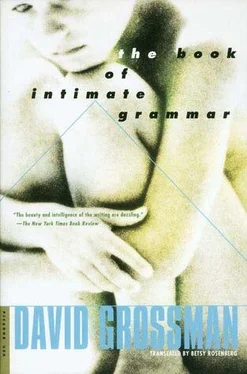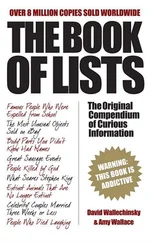Soon he’ll go out. He can hear them all crowding around, having a good time. Yochi enters with another gift. Gamliel and Rochaleh brought him Fisher’s The History of Europe in three volumes, which they bought at a discount from their union, a present to match their faces, said Mama later that evening, as they were making a list of what everyone gave; they already had one set from Yochi’s bat mitzvah, and in any case, books go straight to the storage loft so they won’t bring dust into the salon. Yochi kneels beside him and gently strokes his sweat-moistened hair, careful not to intrude on his privacy. But next year she’ll be in the army, and he’ll be alone. She’s breaking out again with red and yellow pimples and Mama made a crack about it, why didn’t Yochi mention that the bar mitzvah date fell on her curse, now she’ll stay that way forever in the family photographs, she should have known, it comes like clockwork, you have to plan ahead. Yochi blows on his cowlick, trying to make him laugh. She gave him the most wonderful present of all, a Yamaha guitar; three years after the crummy one cracked and all the strings broke, and his parents refused to have it fixed, she took out her savings and bought him a brand-new professional guitar. It was incredible: he, who spent a lifetime entering contests so he could get a Yamaha, had just received one for his bar mitzvah! Yochi follows his gaze back to the black case. “Will you play something for me?” “Later. When they’ve gone.” They giggle. He looks into her eyes. Her face has changed. Once, she was a pretty little girl. She had a great sense of humor. Nowadays you rarely hear a peep out of her.She eats and she sleeps and gets fatter and fatter: she has Papa’s appetite and Mama’s constipation.
“Brace yourself and go out, Aronaleh.” “I can’t handle those people.” “Hey, you want a massage?” “A massage? What, now?” “A fast one. To relax you.” “No.” He recoiled at the thought of anyone touching his body just then. “Aron.” “What?” “Sooner or later you’ll have to go out.” “One more minute. Don’t go.” “Everyone loves you out there.” “Yeah.” They were silent again. “Yochi?” “Yes, sweetie.” “What did you mean that time, about knowing how to survive around here?” “It’s not important.” “It is important.” “Not now. They’re waiting for you.” “Yochi.”
She gazed into his imploring eyes and tousled his hair again. “I didn’t mean anything. Just that — how can I explain it”—she ran her fingers through his curls and noticed they were a darker shade of blond than before—“say you were in the desert, okay?” “Okay.” “Without any shade, and the sun beating down on you.” Silently she envisioned the fingerlike rays, prying into every recess of her life, opening letters, leafing through her secret diary, peeking behind the door when she was deep in conversation with her girl friend Zehava, the only friend she’d ever had, and then Zehava moved to America. And Yochi didn’t try to make new friends. Because the heat was so debilitating. “In the desert, li’l brother,” she hums, winding a ringlet of his hair around her finger, maybe he was too young to speak to this way, though maybe you could still save him, give him a clue, you owe him that much, you’ve been using him as a decoy. “Ouch, Yochi!” “Sorry.” She loosened the ringlet. It’s a lie, it isn’t true, I’ve always loved him, I’ve never been jealous. Okay, you weren’t jealous, but you did use him as your decoy. Nonsense, he’s always been better than me at everything. When they said he was intelligent, you called him a genius. Exactly, I never envied him. Yochi’s lips are moving: I was mature about it; when the art teacher told Mama how well he drew, I said he would be another Picasso. A decoy, to divert attention. Not true. I’ve always been proud of him; and when he played the guitar, I said he has a light … a special light in his eyes … right in front of Mama I said that … Admit it, admit it, you feel guilty about him. She looked at him lying on his bed in that ridiculous outfit, mummified in Mama’s shame. “Because plants that grow in the desert,” she said softly, “have to be wary of the sun, and send out tiny pleated leaves to keep from being burned right away. It’sa hard life in the desert.” She falls silent. She can see in his eyes that he doesn’t understand. Maybe he really is too young.
“Yochi.”
“Yes, Aronaleh.”
“Look into my eyes.”
“Why?”
“Is there a different look in them now? Have they changed? Tell me the truth.”
She doesn’t even ask what he’s talking about. She peers deep into his eyes and says nothing.
“I think I used to have a puppylike look in my eyes. An innocent look.”
“People mature.”
“No, it isn’t that.”
She stood up so he wouldn’t see her faking a smile. “I think I’ll write that down for you.” She rummaged in her drawer for the notebook where she used to record his adorable sayings.
“Come on, what am I, a baby?”
“It’s just so we’ll remember. Someday you’ll get a kick out of it.”
He leaned over her shoulder and read the last entry: “21st of Shevat. Aronaleh is ten and one month. He made up a story about why bambis are brown. Once upon a time, bambis were as colorful as peacocks. And one bambi went out with his parents and the herd but they came to a swamp, and the other deer lay down and cried, because they couldn’t cross it, so the bambi went in first, shouting that he would teach them how to skip across the swamp without drowning, and his parents begged him not to, because God would punish him …”
“Stop it, that’s enough!” Aron shut the notebook in her face. He was pale and earnest. “I don’t want you to write about me anymore. That’s for little kids. That’s over.” But inside he was appalled. Had three whole years gone by without a single noteworthy utterance? Had he been like this for three years already?
Yochi put the notebook back in the drawer. She stood before him limply. There was growing commotion in the salon and cries of Let’s see the bar mitzvah groom.
“I’ll go out and say you’re coming, okay?”
A moment more and he would go out. He peeked at his watch. In New York we’re still asleep. It’s five o’clock in the morning, so it mightstill be possible, theoretically, to call expensive Photo Gwirtz and hire them for the occasion at the last minute. Why not? Outside, there was shouting and laughter. Most of the guests were from out of town, Netanya, Holon, Tel Aviv, and some of them hadn’t seen Aron in two years, since the bar mitzvah of Chomek and Hassia’s son Gidi, when Aron was eleven. What had he been doing for the past two years? Wasting time, that’s what. He stared at the squares on the salon carpet they’d moved into his bedroom for the party. Vichtig, they called the carpet, because the man who sold it to them never stopped talking about himself. Two years. God in heaven. If you add up all the centimeters and kilograms the kids at school have put on in that time you’d have enough to make a whale. He chuckled. Or imagine that they didn’t grow at all, and instead, between rows 2 and 3, there’d be an enormous slippery whale swelling up more and more every minute. Again he hid himself in bed, practicing that sumo technique. Out there, Rivche’s Dov asked hoarsely, What’s happened to the bar mitzvah groom, why are they hiding him? and Mama shouted from the kitchen that he should eat a little tongue meanwhile, she knows how much he loves her tongue. Just thinking about it makes his mouth water, he jested, and Aron remembered Lealeh, his daughter, no one had ever seen her, she’d been in an institution all her life, and you weren’t even allowed to ask how she was.
Читать дальше












